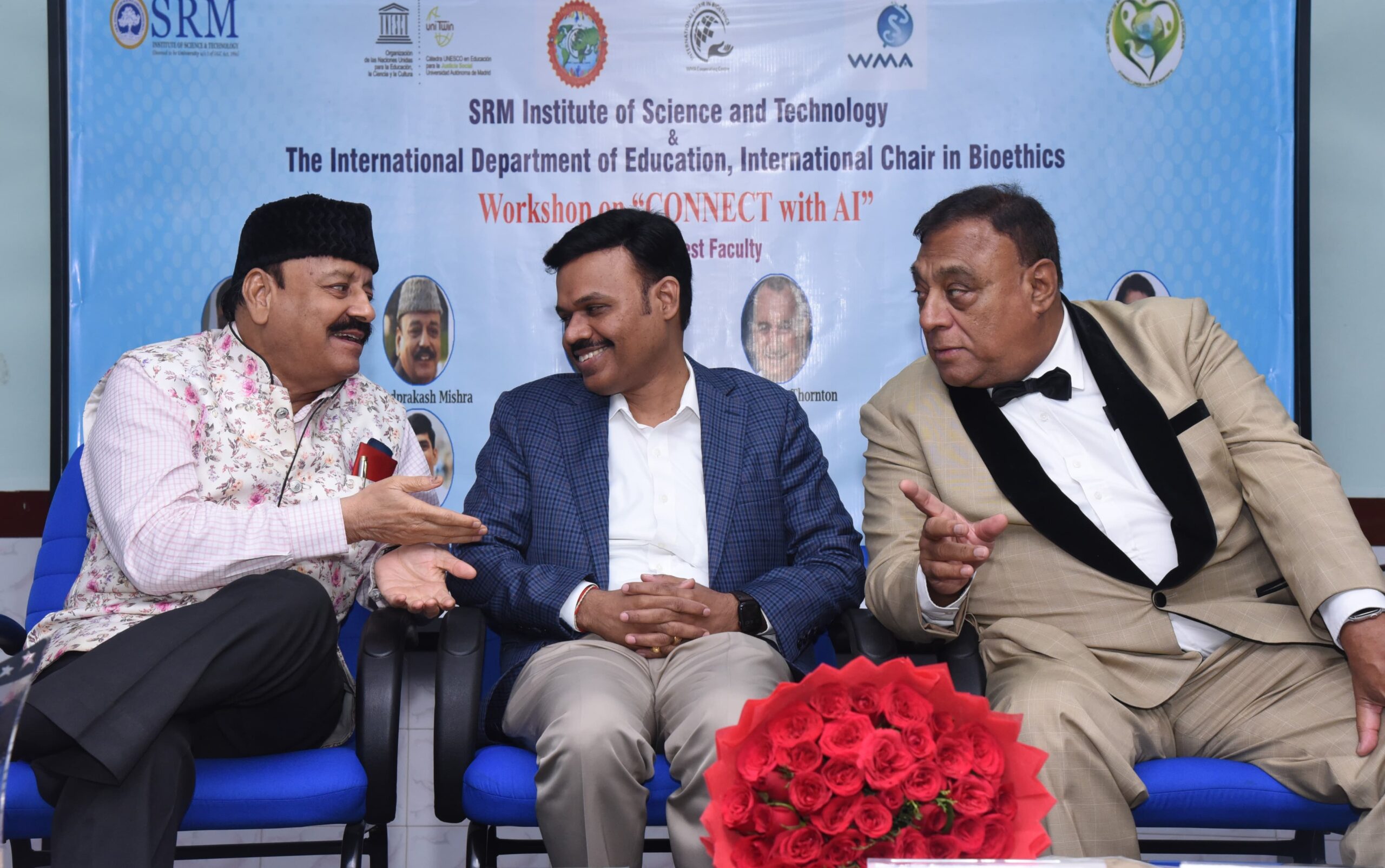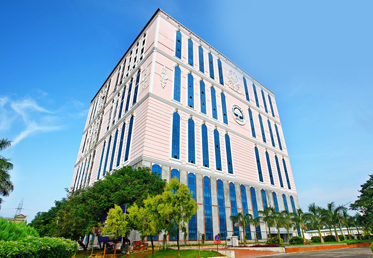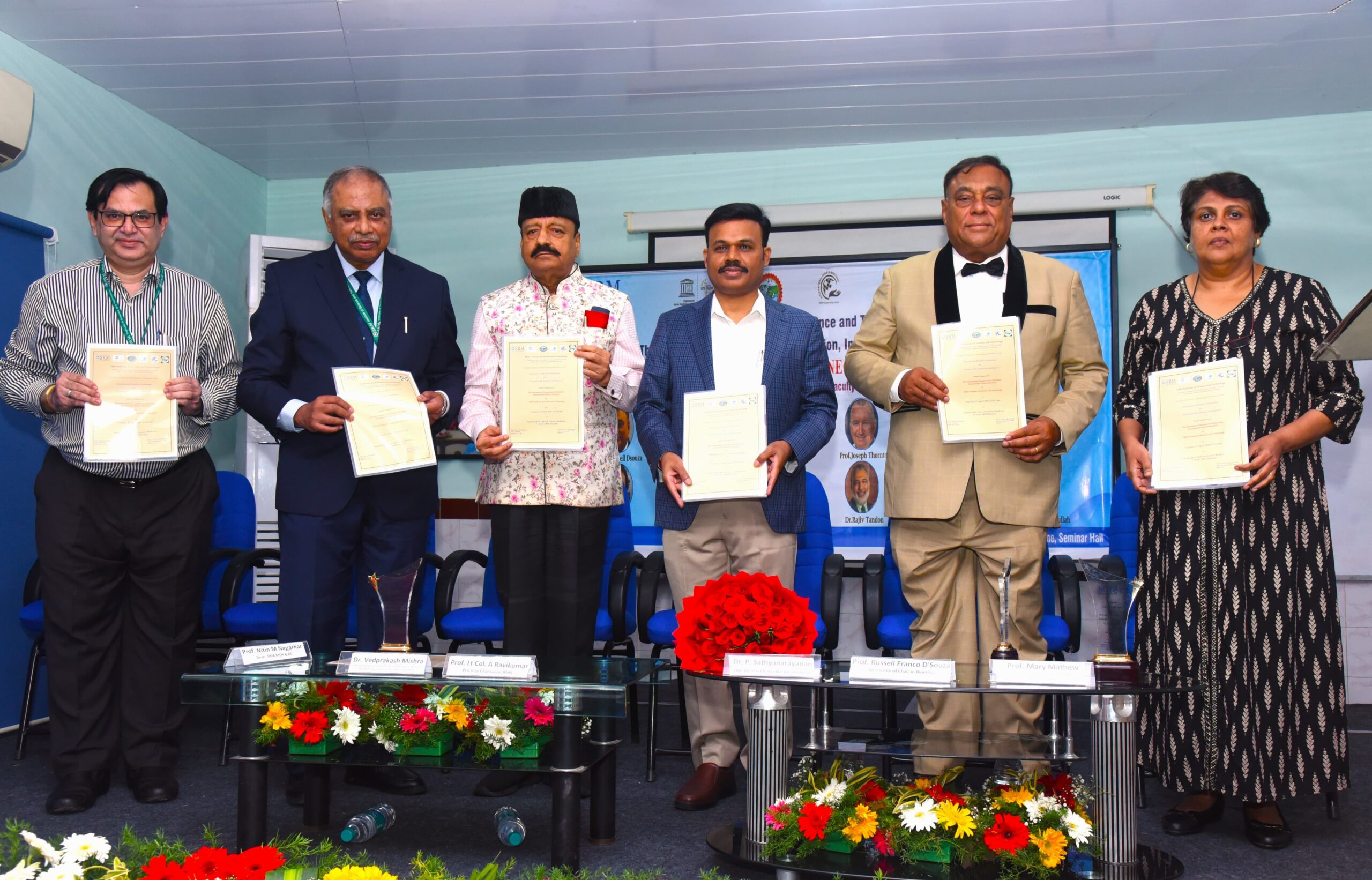Intl. Bioethics Workshop on Connect with AI begins at SRM IST
AI benefits should be harnessed only for
human kind’s benefit: Dr. P.Sathyanarayanan
KATTANKULATHUR,

Artificial Intelligence should only benefit human kind, and there should be a greater involvement of youth, who will be working on its applications in the future, Dr. P.Sathyanarayanan, Pro Chancellor, (Academics), SRM Institute of Science and Technology said on Tuesday.
Delivering his Presidential Address at an International Bioethics Workshop on Connect with Artificial Intelligence (AI), he said that since the dawn of civilisation, human kind was faced with the daunting challenges to distinguish good from bad, right from wrong, ethical from unethical. “Great minds in the world of science and technology have been cautioning about the use of AI. Any application of AI should be used only for the benefit of human kind and not for anything else,” Dr. Sathyanarayanan remarked.
Work towards a responsible future:
Lauding institutions and people for coming together to organise the workshop, Dr. Sathyaranayan said the event could not have been hosted at a more appropriate time. The world was currently witnessing great technological advancements especially in the areas of sophisticated areas like AI. At the current juncture, bringing together experts from medicine, science, engineering, management and law was a good steps towards a responsible future.
The three-day workshop – Connect AI – Collaborative Opportunity to Navigate and Negotiate Ethical Challenges and Trials with Artificial Intelligence, is organised jointly by SRMIST, and The International Department of Education – International Chair in Bioethics.
Dr. Vedprakash Mishra, Secretary General of International Council of Global Network for Medical, Health Professionals & Bioethics Education, in his inaugural address, said the field of medicine mandated empathy, socialisation, humanisation, touch, apart from artistic and scientific contributions. With advancements in medical technology and greater role of robotics in healthcare, accountability assumed a huge role. Mr. Mishra added that all stakeholders in this area should take a holistic view of AI, its advantages and disadvantages, and the ethical conundrums of its applications. With AI becoming an inevitable element in medical treatment, its concerns and challenges should be deliberated in detail.
In his keynote address, Prof. Russell Franco D’Souza, Head and Chair of the Department of Education International Program and International Chair in Bioethics, said the coming together an inter-disciplinary gathering was very important and that a lot could be achieved by people coming together instead of working in silos. While AI had changed the entire landscape of healthcare, with better innovation and precision in diagnosis, and management, some of the daunting challenges need to be addressed, Prof. D’Souza added.
Prof. Mary Mathew, Head, Indian Program and Secretary General Association of Medical Education of India, outlined the core objectives of the workshop and how the deliberations would be taken forward.
Earlier, while welcoming the gathering, Dr. Lt. Col. A.Ravikumar, Pro Vice Chancellor, Medical and Health Sciences, said the workshop will explore the impact of AI in healthcare, apart from offering a glimpse into the wide realm of Bioethics. This was among the few occasions where practitioners from diverse fields – medicine, engineering, management, and law on a single platform to deliberate a crucial aspect of healthcare. Prof. Nitin M. Nagarkar, Dean SRM Medical College Hospital & Research Centre, thanked the gathering.
The key objectives of the workshop include:
Enhancing awareness on ethical implications of AI in Healthcare Technology
Exploring relevant Ethical Frameworks and Principles.
Addressing specific challenges in AI-driven Healthcare systems.
Fostering critical thinking and ethical decision-making skills
Promoting responsible and evidence-informed AI implementation
Faculty from medical, dentistry, nursing, allied Health Sciences, engineering, and law took part in the workshop, organised with the objective of creating a deep understanding of ethical issues surrounding AI and health. Faculty, researchers, scholars, experts, and leaders of global and national institutions working in the sphere of medical education, made their presentations and moderated sessions on a range of topics including AI’ impact on healthcare, ethical conundrums of AI’s implications in healthcare, technology, and research, balancing human judgement and AI recommendations in decision-making, evidence-informed best practices and guidelines, and action planning for responsible AI among others.
PHOTO CAPTION:
Dr. P.Sathyanarayanan, (third from right), Pro Chancellor, (Academics), SRMIST, at the inauguration of Connect AI – Collaborative Opportunity to Navigate and Negotiate Ethical Challenges and Trials with Artificial Intelligence – a three-day workshop organised by SRMIST and The International Department of Education – International Chair in Bioethics at Kattankulathur on Tuesday. Others in the picture are (from left): Prof. Nitin M. Nagarkar, Dean SRM Medical College Hospital & Research Centre, Dr. Lt. Col. A.Ravikumar, Pro Vice Chancellor, Medical and Health Sciences, Dr. Vedprakash Mishra, Secretary General of International Council of Global Network for Medical, Health Professionals & Bioethics Education, Prof. Russell Franco D’Souza, Head and Chair of the Department of Education International Program and International Chair in Bioethics, and Prof. Mary Mathew, Head, Indian Program and Secretary General Association of Medical Education of India.


